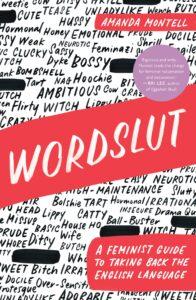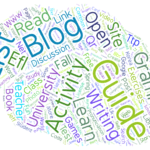 Wordslut: A Feminist Guide to Taking Back the English Language by Amanda Montell is a comprehensive exploration of the English language’s gendered intricacies. Montell, a linguist and writer, takes readers on a journey that uncovers the biases embedded in our everyday language and offers insights into how we can challenge and change these norms.
Wordslut: A Feminist Guide to Taking Back the English Language by Amanda Montell is a comprehensive exploration of the English language’s gendered intricacies. Montell, a linguist and writer, takes readers on a journey that uncovers the biases embedded in our everyday language and offers insights into how we can challenge and change these norms.
- The Gendered Nature of Language: Montell starts with a foundational premise: language is not an impartial tool but is deeply intertwined with societal values and norms. This means that words, phrases, and even grammatical structures can carry gendered implications. For instance, professions ending in “-man” (like “fireman” or “chairman”) inherently exclude or diminish the presence of women in those roles. Similarly, terms like “shrill,” “nagging,” or “bossy” are disproportionately used to describe women, often with negative undertones. These linguistic choices, Montell argues, don’t just reflect societal biases—they actively reinforce them.
- Historical Linguistic Sexism: Montell provides a historical lens to understand the evolution of gendered language. She traces the origins of various words and expressions, revealing their often sexist roots. For example, the word “hysterical” is derived from the Greek word for uterus, suggesting that women’s emotions are irrational and tied to their reproductive organs. Similarly, the term “gossip,” which now has a negative connotation, originally meant a close female friend. Over time, as women’s close friendships became viewed with suspicion, the term evolved to mean idle talk or rumor. By understanding these historical shifts, Montell suggests, we can challenge the continued use of such biased language.
- The Evolution of Pronouns: Pronouns play a pivotal role in our language, especially when discussing gender identity. Montell delves deep into the topic of pronouns, particularly in the context of non-binary and transgender identities. The traditional binary pronoun system (he/she) is limiting and doesn’t account for the spectrum of gender identities. Montell discusses the rise and acceptance of the singular “they” as a gender-neutral alternative. She also addresses the resistance to its usage, often rooted in a lack of understanding or outright prejudice. By embracing a more inclusive pronoun system, Montell argues, we can make significant strides toward linguistic equality.
- The Power Dynamics of Speech Patterns: Montell examines various speech patterns that have been gendered over time. Patterns like “uptalk” (ending statements with a rising intonation) and “vocal fry” (a creaky voice quality) are often associated with young women. Critics argue that these patterns undermine women’s authority or intelligence. However, Montell points out that these criticisms are less about the speech patterns themselves and more about controlling and policing women’s voices. By understanding the underlying power dynamics, we can challenge these biases and allow for a broader range of acceptable vocal expressions.
- The Reclamation of Derogatory Terms: Words have power, and Montell discusses how historically derogatory terms have been reclaimed by feminist and LGBTQ+ movements. Terms like “witch,” “queer,” or “slut” were once used to demean and marginalize. However, through reclamation, these words have been transformed into symbols of empowerment and identity. Montell explores the processes and implications of such linguistic shifts, emphasizing the power of communities to redefine their narratives.
- The Global Perspective: Montell broadens the discussion by looking at gendered linguistics from a global perspective. Different languages and cultures have unique ways of grappling with gender norms. For instance, some languages, like Finnish, have always had gender-neutral pronouns, while others, like Spanish, have deeply gendered noun and adjective systems. By examining these global linguistic structures, Montell offers a more comprehensive understanding of the challenges and possibilities for feminist linguistic reform.
- The Future of Feminist Linguistics: Ending on a hopeful note, Montell envisions a future where the English language evolves to reflect more inclusive values. She believes that as society becomes more aware of gender biases, language will adapt. Montell encourages readers to be active participants in this evolution, advocating for linguistic change at both individual and societal levels. She emphasizes that everyone, regardless of gender, has a stake in this transformation, as it paves the way for a more equitable and just society.
In “Wordslut,” Amanda Montell masterfully unravels the complex tapestry of gendered language. Through historical insights, cultural comparisons, and forward-looking optimism, she presents a compelling case for linguistic reform. By understanding and challenging the biases in our everyday language, Montell suggests, we can create a more inclusive linguistic landscape for all.
Discussion Questions
- How does the gendered nature of language, as discussed by Montell, impact our daily interactions and perceptions?
- Why do you think certain speech patterns, like “uptalk” and “vocal fry,” are particularly criticized when used by women?
- How can understanding the historical origins of words help in challenging their current biased usage?
- In what ways do you think the binary pronoun system limits our understanding and expression of gender identities?
- How do you feel about the use of the singular “they” as a gender-neutral pronoun? Do you think its widespread acceptance is inevitable?
- Montell discusses the reclamation of derogatory terms by feminist and LGBTQ+ movements. Can you think of other examples where marginalized communities have reclaimed words? What is the significance of such reclamation?
- How do other languages you’re familiar with handle gender in their linguistic structures? Are there lessons English can learn from these languages?
- Why is it important to consider a global perspective when discussing gendered linguistics?
- How do you envision the future of the English language in terms of gender inclusivity?
- Montell emphasizes the role of individuals in driving linguistic change. How can individuals effectively challenge and reshape gendered language norms?
- How does the policing of women’s voices, through criticism of certain speech patterns, reflect broader societal power dynamics?
- Why do you think professions ending in “-man” (like “fireman” or “chairman”) have persisted, and how can we promote more gender-neutral alternatives?
- How do you feel about the reclamation of words like “witch” or “slut”? Is there a line between empowerment and perpetuating negative stereotypes?
- Montell is optimistic about the future of feminist linguistics. Do you share her optimism? Why or why not?
- How can educators, writers, and media personalities play a role in promoting a more inclusive and gender-neutral linguistic landscape?
Vocabulary Words
Intricacies The quality of being intricate; complexity.
The intricacies of the legal system can be daunting for those unfamiliar with it.
Linguistic Relating to language or linguistics.
Her linguistic skills were evident when she fluently spoke five languages.
Uptalk A manner of speaking in which declarative sentences are uttered with rising intonation at the end, as if they were questions.
Some people find uptalk distracting, while others see it as a natural part of conversational speech.
Vocal fry A low, creaky vibration in the voice.
Critics often target young women for using vocal fry, claiming it sounds unprofessional.
Derogatory Showing a critical or disrespectful attitude.
Using derogatory language can be hurtful and offensive to others.
Reclamation The process of claiming something back or of reasserting a right.
The reclamation of the term “geek” by tech enthusiasts turned a once-insulting term into a badge of pride.
Linguistic reform Changes and improvements made to a language to make it more modern, efficient, or fair.
Some advocates push for linguistic reform to make English spelling more consistent.
Binary Relating to two things; in this context, it refers to the traditional division of gender into male and female.
The binary perspective on gender has been challenged by increasing recognition of non-binary identities.
Tapestry Something that is considered complex or intricate, like a woven fabric.
The cultural tapestry of the city was evident in its diverse festivals, foods, and traditions.
Marginalized Treated as insignificant or peripheral.
Historically, many indigenous cultures have been marginalized by dominant societies.
Views: 18






Leave a Reply